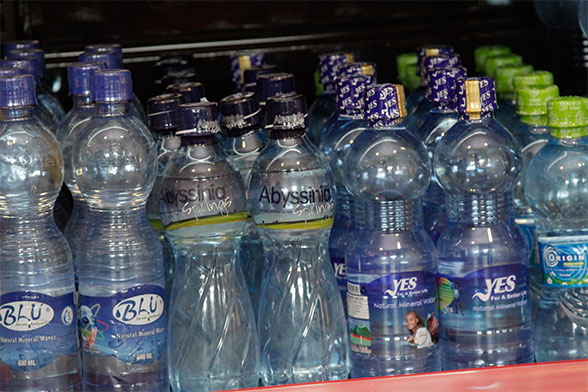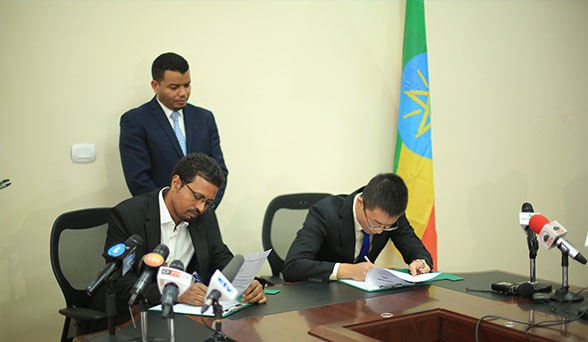
Sunday with Eden | Dec 14,2024
Jul 20 , 2019
By SELAMAWIT MENGESAHA ( FORTUNE STAFF WRITER )
 Bottled water will no longer have neck seals.
Bottled water will no longer have neck seals. Bottled water will no longer have neck seals beginning this week, according to the new decision passed by the bottlers' association.
To be effective on July 23, 2019, the decision was made by Ethiopian Bottled Water & Soft Drinks Manufacturing Industries Association with the main aim of saving foreign currency and to curtail the negative impact of plastic on the environment.
“The packaging is very small, making it difficult to be collected and easily recycled," said Getnet Belay, chairperson of the Association, which was legally formed in April 2018 with 33 founding members.
Ahead of the new decision, the Association conducted a detailed study on the effect of neck seal packaging with bottlers, the Environment & Climate Change Commission and consumers, according to Getnet.
The study focused on the health, economic and environmental issues arising from the use of neck seals.
Before announcing the final decision, the Association received approval from the Food & Drugs Administration (FDA), the Food, Beverage & Pharmaceutical Industry Development Institute, the Ministry of Trade & Industry and the Ethiopian Standardization Agency (ESA).
While approving the decision, the FDA and ESA stated that the seal does not contribute to the health and safety or the quality of the product, but instead has a negative impact on the environment. They also noted that the seal is not commonly used in other countries, nor is it mandatory under Ethiopia’s standardisation rule.
"Neck seal packaging is a tradition carried over from pioneer water companies," said Getnet, "but it can't be a measurement for standard or quality."
The 85 water bottlers each spend between 40,000 dollars and 50,000 dollars on a yearly basis to import neck seal packages depending on their production capacity. They also incur additional labour costs for the application process. The nation spends 3.5 million dollars to four million dollars a year to import neck seal products.
"Ethiopia is the only country that uses neck seals on the packaging," said Solomon Tadele, director-general of the Food, Beverage & Pharmaceutical Industry Development Institute.
Water bottlers also celebrate the decision.
Eva Water, which is bottled by Nyala Plc, a company established in 2017 with 44 million Br and produces 16,000 bottles an hour, is one of them.
"It will save us a considerable amount of foreign currency," said Fethi Abdulqadir, the general manager and shareholder of the company, which currently cuts production by half due to a consistent power outage and shortage of raw materials.
The owners of the company have been spending 40,000 dollars a year to import the seal, according to Fethi.
"We pay up to six dollars for one kilogram of neck seals," said Fethi. "The cost of a neck seal for a single bottle runs from five cents to ten cents."
One kilogram of neck seals can be used for 2,500 bottles.
Damot Industrial & Commercial Plc, founded by Semachew Mekonen in 2016, and Gift Water are other companies that support the bottle seal removal.
"We have been investing 40,000 dollars to 50,000 dollars a year importing the seal," said Seray Yeshawanew, deputy manager of Gift Water, which bottles 10,000 half-litre; 8,000 one litre; and 6,000 two-litre bottles of water an hour.
Kaleab Baye (PhD), director of the Centre for Food Science & Nutrition at Addis Abeba University, says that consumers should not relate the seals with quality.
"They should focus on the quality of water and fair prices instead," said Kaleab.
He also says that the Association should have notified the public before removing neck seals to avoid consumer confusion.
PUBLISHED ON
Jul 20,2019 [ VOL
20 , NO
1003]

Sunday with Eden | Dec 14,2024

Commentaries | Jan 03,2021

Radar | Nov 14,2020

Life Matters | Feb 26,2022

Featured | Jun 24,2023

Commentaries | Nov 16,2019

Radar | May 21,2022

Radar | Sep 21,2019

Fortune News | Apr 20,2019

Radar | Mar 30,2019

Dec 22 , 2024 . By TIZITA SHEWAFERAW
Charged with transforming colossal state-owned enterprises into modern and competitiv...

Aug 18 , 2024 . By AKSAH ITALO
Although predictable Yonas Zerihun's job in the ride-hailing service is not immune to...

Jul 28 , 2024 . By TIZITA SHEWAFERAW
Unhabitual, perhaps too many, Samuel Gebreyohannes, 38, used to occasionally enjoy a couple of beers at breakfast. However, he recently swit...

Jul 13 , 2024 . By AKSAH ITALO
Investors who rely on tractors, trucks, and field vehicles for commuting, transporting commodities, and f...

Jul 5 , 2025
Six years ago, Ethiopia was the darling of international liberal commentators. A year...

Jun 28 , 2025
Meseret Damtie, the assertive auditor general, has never been shy about naming names...

Jun 21 , 2025
A well-worn adage says, “Budget is not destiny, but it is direction.” Examining t...

Jun 14 , 2025
Yet again, the Horn of Africa is bracing for trouble. A region already frayed by wars...